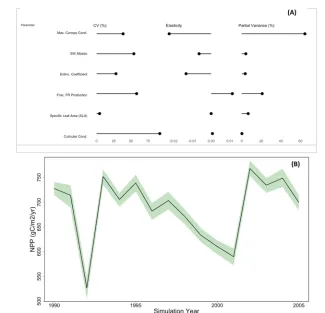Arctic tundra plant communities are currently undergoing unprecedented changes in both composition and distribution under a warming climate. More precise estimates of these future vegetation shifts is a key challenge due to both a scarcity of data with which to parameterize vegetation models, particularly in the Arctic, as well as a limited understanding of the importance of each of the model parameters and how they may vary over space and time. Here we work to address these issues by exploring the capacity to constrain model parameters and simulate Arctic vegetation dynamics by incorporating the Dynamic Vegetation, Dynamic Organic Soil, Terrestrial Ecosystem Model (DVM-DOS-TEM) into the PEcAn framework to conduct formal model-data integration experiments. To date we have successfully integrated DVM-DOS-TEM into PEcAn including preliminary PEcAn UQ ensemble simulations (see below) running on the BNL modex server cluster (https://modex.bnl.gov). Initial results demonstrate that the PEcAn framework can be used to identify the parameters driving uncertainty in DVM-DOS-TEM and that observations, including ongoing NGEE-Arctic data collections, can be used to reduce model spread and inform simulations. Future work will expand this initial testing to all Arctic PFTs and run larger multi-site UQ simulations to identify the critical measurements needed to further improve model simulations with DVM-DOS-TEM across high-latitude ecosystems. This work will also feed into the developments of ALM, including later comparisons of PEcAn.DVM-DOS-TEM and PEcAn.ALM simulations of Arctic vegetation dynamics. We are developing an AGU presentation to highlight our current modeling results.
For more information, please contact:
Shawn Serbin
sserbin@bnl.gov

